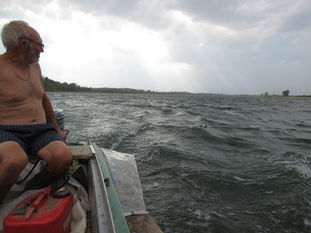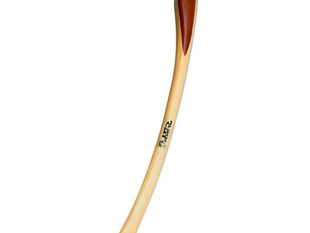
My father’s all terrain vehicle (ATV), lovingly called ‘The Mechanical Donkey’, proved to be indispensable for the seasonal Danube adventures. Its main use was for making weekly trips to the nearby villages: Kovachitsa and Stanevo. The trips were for groceries and bottled mineral water.
Although further away from Stanevo, Kovachitsa had much more to offer. There were as many as four groceries there, generally well stocked with food products. Most importantly, cheap chicken and turkey carcasses could be found there – an item of food the jackal family relished. So much so, that when they hear The Donkey setting off on the road to Kovachitsa, they would be anticipating the evening banquet. A great chorus howling would accompany that and the whole jackal family would be present at the feast.
Apart from the carcasses, there was bread to buy in Kovachitsa, sunflower oil, yoghurt, rice, beans, pasta. There was a petrol station also, where fuel and lubricants could be bought, and empty propane-butane canisters filled up. There was also a pharmacy, where the all-important anti-mosquito spirals and sprays could be found, as well as fly traps. But the greatest attraction of Kovachitsa was a family shop selling homemade cheese. My father’s claim was that this was the best cheese in the country. He would buy seven kilos about once a month and then dry it in the sun. This way it could be finely grated on salads and pasta.

The road to Kovachitsa ran through vast fields of corn. When the cobs were young, ‘milk-ripe’, they were an attractive addition to the daily menu – for my father and for the jackals. The only difference there was that the jackals ate them cobs and all.
Stanevo, by comparison, was a very run-down affair in the way of shops and generally. To compensate for this, it was rich in social contacts. On the practical side, they led to opportunities for buying home-grown vegetables.
After three kilometres across vineyards and corn-fields, the first place one stopped at in Stanevo was Milka’s coffee shop: a whitewashed hut with two round tables and some chairs outside. A humble appearance but here was the information hub of the village. All fishermen and workers in the big Pomodiana vineyard would make it a point to be here at nine in the morning for a cup of coffee and innumerable cigarettes. This was the time and place for exchanging news. My father would try to be at these gatherings at least once a fortnight, and get the latest fishing and jackal-related news. Another of the strong points of Stanevo was that spring-water could be loaded at the fountain by the village church. Lintel blossoms could be picked from the trees in the village square in early June. Spread on newspapers to dry they would make excellent tea. From Ivo’s bee-hives fresh honey could be bought later in June, as also honey-comb pieces. In July, it was time for tomatoes and peppers from Velko’s, and cucumbers from Maria’s garden. Then the watermelons and honey melons came, and by the end of August – the first grapes from the vineyard. The jackals ate every scrap of food that remained from my father’s table, including melon rinds. The only things they wouldn’t touch were onion and lemon skins.

But all these goods – and water – had to be carried across the fields and the Donkey was a great help in that. In return one needed to take good care of it, which meant nearly constant repairs. The most serious need for such arose when the carrying frame broke in two towards the end of last summer. It was welded together later in October, but then the carburetor and the whole electrical system had to be taken care of. This part was the second major repair after the one of my father’s arm. Work began already in the first week of April.

Here a word of caution to anyone in the mind of becoming a proud owner of a Chinese four-wheel bike. The engine itself (Shinerai) is quite good, despite Google having other ideas, associatively speaking. To quote: ‘Omae wa mou shinde iru itself is Japanese, and it means you're already dead.’ The machine is Chinese, but the quoted phrase somehow rings true – maybe because the bike is surely a pirated version of a Japanese make? Whatever the case, the bitter truth is that apart from the engine hardly anything on the machine will not need repair from the first minute and then constantly. Indeed, the Donkey was bought in November 2020, but it was ready for serious use only many months later. Its first working season came to be Summer ’21.

My father’s advice to prospective buyers is that they first get themselves a basic repair shop, like the one at the family muesli-factory, and then a good mechanic.

By 5 April this year the ATV was proclaimed ready for the new Field Camp Season ‘25.
Afterward, the team dove into further repairs and some new purchases.
Meanwhile in London: I have immersed myself in the task of planning my camp stay. I huddled over my phone, booking flights and browsing through countless options for a new tent. My mind was set on one crucial feature: it had to be robust enough to brave winds and rain that could come our way (last year's Decathlon tent had a leaking roof).
I had arranged already a suitable 4X4 vehicle to wait for us at the Sofia Airport.
Now I had to focus on what was a most challenging task here at home: finding a cat-sitter for Pepper and Nettles. It has to be said that without the immense support of family and friends, telling the story of Boldy and his Golden Jackals family wasn't going to be possible. Perhaps the name of the blog should be Of Jackals, Friends and Family.
The next post is further following the frantic preparations on both sides of The Channel.






